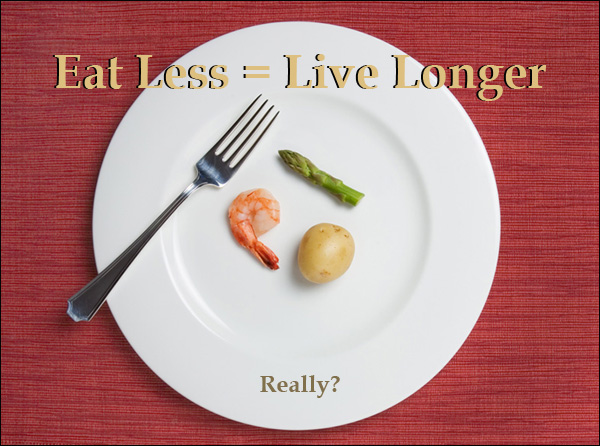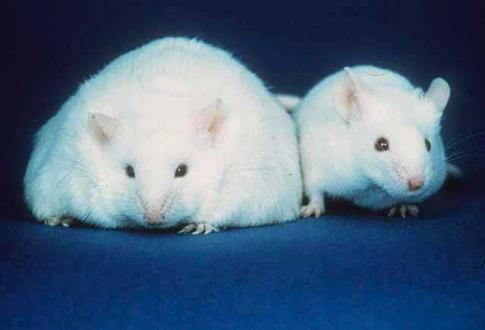 Eating Less Prolongs Life (maybe)
For years scientists have been puzzled by an apparent paradox. We know that food is necessary to sustain life. But why is it that some animals, like laboratory rats, can live as much as twice their normal life spans when they are fed very little food? How does borderline starvation extend life?
Researchers at Mount Sinai School of Medicine set out to address this question and to understand another fact: exactly how does overconsumption accelerate age-related disease?
Dr. Mobbs and his colleagues unraveled a molecular puzzle to determine that within certain parameters, a lower-calorie diet slows the development of some age-related conditions such as Alzheimer's disease, as well as the aging process. How the diet is restricted -- whether fats, proteins or carbohydrates are cut -- does not appear to matter.
On the other hand, a high calorie diet seems to accelerate age-related disease by promoting oxidative stress.
Dietary restriction induces a transcription factor called CREB-binding protein (CBP), which controls the activity of genes that regulate cellular function. By developing drugs that mimic the protective effects of CBP -- those usually caused by dietary restriction -- scientists may be able to extend lifespan and reduce vulnerability to age-related illnesses.
Where's the balance?
The team found an optimal dietary restriction, estimated to be equivalent to a 30 percent caloric reduction in mammals, increased lifespan over 50 percent while slowing the development of an age-related pathology similar to Alzheimer's disease. That's pretty amazing. Human life could be extended to an average of over 100 years if this is applicable to our species.
The first part of the study looked at C. elegans, a species of roundworm, that were genetically altered to develop Alzheimer's disease-like symptoms. Dr. Mobbs and his team reduced the roundworms' dietary intake by diluting the bacteria the worms consume. In these types of roundworms, human beta amyloid peptide, which contributes to plaque buildup in Alzheimer's disease, is expressed in muscle, which becomes paralyzed as age progresses. This model allowed researchers to readily measure how lifespan and disease burden were simultaneously improved through dietary restriction.
The researchers found that when dietary restriction was maintained throughout the worms' adulthood, lifespan increased by 65 percent and the Alzheimer's disease-related paralysis decreased by about 50 percent.
In the second part of study, Dr. Mobbs and his team looked at the other end of this process: What happens to CBP in a high-calorie diet that has led to diabetes, a disease in which glucose metabolism is impaired? Researchers examined mice and found that diabetes reduces activation of CBP, leading Dr. Mobbs to conclude that a high-calorie diet that leads to diabetes would have the opposite effect of dietary restriction and would accelerate aging.
Dr. Mobbs hypothesizes that dietary restriction induces CBP by blocking glucose metabolism, which produces oxidative stress, a cellular process that leads to tissue damage and also promotes cancer cell growth. Interestingly, dietary restriction triggers CBP for as long as the restriction is maintained, suggesting that the protective effects may wear off if higher dietary intake resumes. CBP responds to changes in glucose within hours, indicating genetic communications respond quickly to fluctuations in dietary intake.
But not everyone agrees
Michael Forster, of the University of North Texas Health Science Center and Raj Sohal, professor at the University of Southern California's School of Pharmacy, compared the life span and caloric intake of two genetically engineered strains of mice. They discovered that not all mice benefit with long lives when subjected to less food.
One strain of rats, the "fat strain" [above left],roughly doubles in weight over its adult life. That strain benefited from caloric restriction. But the "lean strain" [above left], which never becomes obese, did not benefit from the caloric restrictions.
"Your energy expenditure and your energy intake should be in balance," Sohal said. "It's as simple as that. And how do you know that? By gain or loss of weight. The whole thing is very commonsensical."
Not for older humans!
For humans of normal weight, Sohal strongly cautions against caloric restriction. In a 2003 study, he and Forster found that caloric restriction begun in older mice -- both in "fat strains" and "leaner strains" -- actually shortened life span. However, Sohal said that obese individuals are probably better off cutting calories than increasing their exercise to make up for overeating. Overly vigorous exercise can lead to injuries and long-term wear and tear.
In other words, it is better to skip the double cheeseburger than to turn up the treadmill after binging at Carl's Jr.
What to do?
Remember the initial study suggested that by developing drugs that mimic the protective effects of CBP -- those usually caused by dietary restriction -- scientists may be able to extend lifespan and reduce vulnerability to age-related illnesses. Don't start starving yourself... wait for the pill!
|
 An answer lies in a two-part study led by Charles Mobbs, PhD, Professor of Neuroscience and of Geriatrics and Palliative Medicine at Mount Sinai School of Medicine, published in the November 17 edition of the journal PLoS Biology. The study examines how dietary restriction and a high-caloric diet influence biochemical responses.
An answer lies in a two-part study led by Charles Mobbs, PhD, Professor of Neuroscience and of Geriatrics and Palliative Medicine at Mount Sinai School of Medicine, published in the November 17 edition of the journal PLoS Biology. The study examines how dietary restriction and a high-caloric diet influence biochemical responses.
